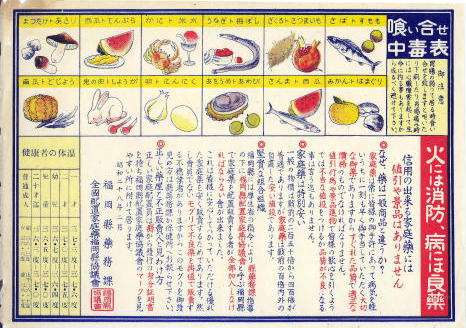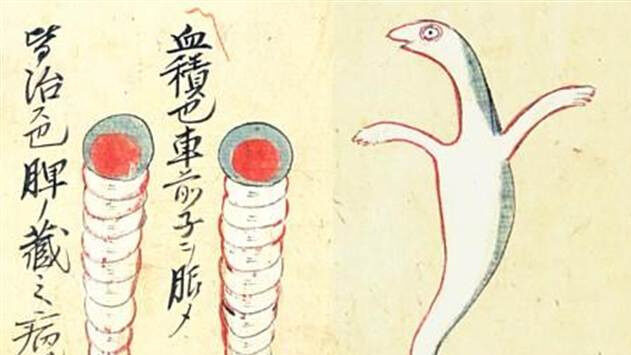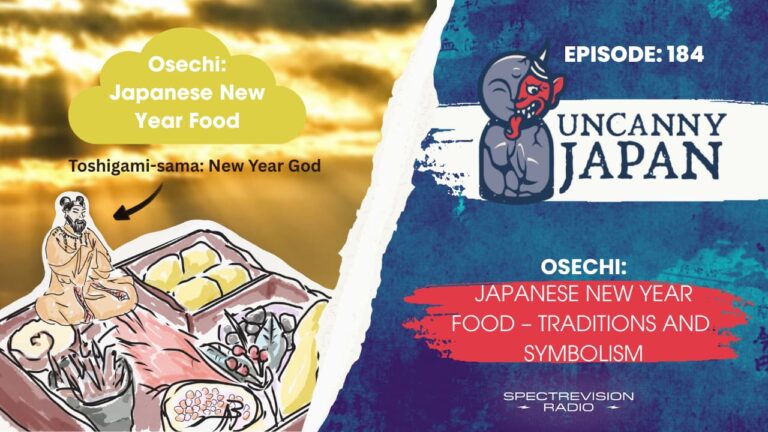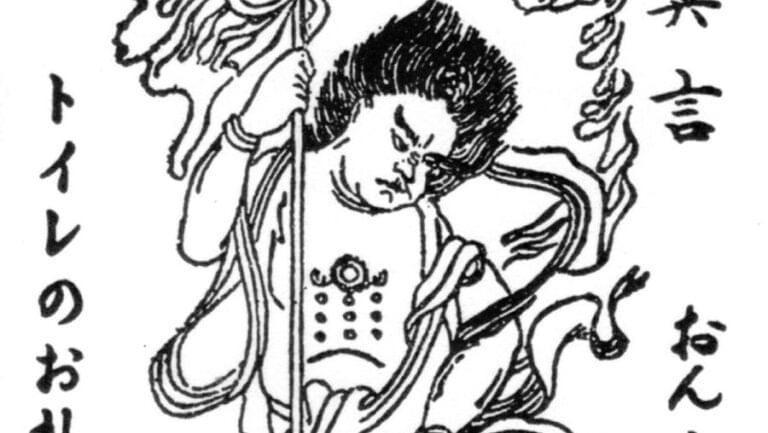Why shouldn’t you eat crab and watermelon together? What will happen if you don’t eat all the rice in your bowl? Today I’ll answer these and a whole lot more. Japanese food superstitions and sayings are quite interesting and sometimes funny.

Eel Restaurant
Let’s pretend you’re traveling around Japan and you end up in a small town. There are mom and pop shops all up and down this narrow road. Pottery, rice, a place that weaves those straw tatami mats, and a store that makes homemade senbei rice crackers that smells divine. You realize how hungry you are. Looking a few shops up the road you spot a hole in the wall restaurant. Out front is a split noren-curtain flapping in the breeze. This let’s you know that the shop is open. The characters “u na gi” are brushed on noren in black ink and alongside that, the image of a happy eel twisting its way up the cloth.
Eel! You love eel.
You duck into the restaurant. Irrashaimase~ is called out by both the the cook in the back and his wife who is working as a waitress. With a flip of the hand she says, Doko demo ii desu yo. You can sit where ever you want. There are only five small tables and a bar that faces the back into the kitchen. You choose a little table by a window and after a cursory glance at the hand written menu, you order the unadon. Rice with grilled eel on top. You wait expectantly.
A little while later the wife-waitress comes over and sets a wide mouthed lacquer bowl in front of you. Two filets of grilled eel atop white rice. You can almost taste the sweet salty tare-sauce that has been brushed over the unagi, again and again as it was grilled over hot coals.
You pick up your chopsticks, itadakimasu! The wife-waitress smiles at you. You like eel, you speak Japanese, and you can use chopsticks. She takes the tiny tea pot and starts to fill your cup. You look around the table, something is missing. One of your favorite foods. Umeboshi. Pickled plums.
You ask the wife-waitress in your wonderful Japanese, could she bring you some? A look of horror crosses her face. She drops the tea pot and it smashes on the floor. She screams.
What did you do? Well, I’ll tell you on today’s episode of Uncanny Japan. More specifically, I’ll tell you about various food sayings and superstitions. There are quite a few and they’re quite fun, so keep listening.
Intro/Welcome
Hey hey, everyone. How are you doing? I’m fine, thank you. It’s been raining here like crazy. Maybe you’ve seen the horrible news out of Kyushu, all the flooding and mudslides. It’s heartbreaking. Other places are getting hit, too. We’ve had non stop rain for weeks it seems and have had some flooding, landslides, and blackouts, but I haven’t read or heard anything about injuries or deaths in my area yet. Checking the weather and it looks like it isn’t going to let up anytime soon.
That said, today was a very rare sunny day here. And as if by magic, the cicadas came out. It’s supposed to start raining again tomorrow, so they’re going to have to wait until the end of this rainy season before summer officially starts.
A little news about something new we’re going to be trying out. We, being Rich Pav my sound and tech guy. Here, I’ll give him the mic.
Rich Pav Cooks in Japan
Unless you grew up in a Japanese household or have lived in one, I’m going to guess you don’t know what Japanese people really eat at home. But I’m just guessing. I’ve never even seen a single episode of Iron Chef, and in the past 30 years, I’ve eaten at Japanese restaurants in America exactly two times.
I’m going to start making videos to show what kinds of foods people here typically make in their kitchens and how they do it. I want to teach people things that are considered basic food-related common knowledge, so that if you ever walk into any Japanese supermarket, you’ll not only know what you’re looking at, you’ll also know what to do with it after you take it home.
I’m taking this on mostly for Uncanny Japan Patrons. They help Terrie and me pay our monthly bills and rent by contributing anywhere between 2 and 50 dollars a month. We used to mail all kinds of stuff to $15 a month and up Patrons, but thanks to the coronapocalypse, we can’t do that right now and we don’t know how long it’s going to last.
A number of Patrons have said they’d like to us to share Japanese recipes, so I bought a little action camera to strap to my forehead while I cook and teach you what I know about normal, everyday Japanese food people make in their kitchens, including the time-saving short cuts they use and the packaged stuff you can buy that you just have to add fresh ingredients to. So no Iron Chef food. No American strip mall Sushi Hut food. And probably not food that’s going to get you likes on Instagram. I just want to show you how to make food that going to taste as close as possible to real Japanese home cooking. For all you language learners out there, I’m going to teach basic food vocabulary so you’ll be able to understand Japanese food vloggers and read recipes written in Japanese.
So here’s the part online marketers call “the call to action.” I’ve got whole bunch of questions I want to ask our Patrons. Like, what are some things you want to see? What do you want to learn? And most importantly, I need to know what ingredients you can and can’t get from local supermarkets or online. If you’re a Patron or you’d like to become one, please visit the Uncanny Japan Patreon page and fill out the cooking video questionnaire. The link is in this episode’s description, or just type three words into Google: Uncanny Japan, Patreon. And now, back to Terrie.
Okay, let’s get started with the show. There are quite a few superstitions involving food here in Japan and a lot of them I find really interesting. Let me start with:
Superstitions
1. Myouga wo taberu to mono wasure suru. ミョウガを食べると物忘れする。
To understand this one you need to know about an interesting plant called a myouga. I’ve seen it called Japanese ginger. Although similar, kinda, it’s really got its own unique taste. One of those you love it or you hate it tastes. It’s kind of nice in small doses.
Myouga grows in Japan, China and South Korea. It’s recognizable by its small bulby shape and purple-ish skin and it can be eaten fresh or pickled. The way I see it eaten most often around here is being very finely sliced with a knife and used as a garnish on different Japanese dishes, like miso soup, roasted eggplant, and cold somen noodles to name a few.
It can usually be found year round, but its true season is June and July.
Now to the superstition. It states that if you eat too much myouga you’ll become forgetful.
Well, it seems that one of the Buddha’s great disciples was a man named Shuri Handku. He was a devoted follower of the Buddha, he just happened to be extremely forgetful. After he passed away, myouga started growing on his grave. Suddenly eating myouga became associated with being forgetful.
So there you go.
2. Gohantsubu wo nokosu to me ga tsubureru. ご飯粒を残すと目が潰れる。
When eating rice, don’t leave even a single grain behind. If you do, your eyes will get smushed. Gross, right? This one is thought to have come about to make sure children eat all their food. I think being told my eyes would get smushed would have worked better than there are starving children in the world, eat all your food.
Eating all your rice in your bowl down to the last grain is thought to be a very noble and polite thing to do.
I once heard this weird story from a friend. A woman was on a train sitting next to some random man. She was eating her lunch and ate it very cleanly, daintily but also not leaving any rice at the bottom of her obento bako. The man was so impressed he asked her to marry him. I guess he was some super rich CEO or something. I know there is a lot to unpack there.
Moving on to number three!
3. Suika no tane wo nomu to mouchou ni naru. スイカのタネを飲むと盲腸になる。
If you eat watermelon seeds you’ll get appendicitis. I’m not sure why, but as kids we did all believe if you ate watermelon seeds vines would grow from your throat, so…related?
4. Su wo nomu to karada ga yawarakakunaru 酢を飲むと体が柔らかくなる。
Drinking vinegar makes you more flexible. Keep in mind that the word yawarakai means both soft, as in a soft pillow and flexible, as being able to touch the floor with your palms.
You can kind of follow the logic here. Marinating meat in vinegar will break down the proteins and make the meat soft. Therefore, a frail kind of logic would state that by drinking a little vinegar you become more yawarakai, flexible. Although thinking about this now, I do hope this wasn’t originally a type of Hansel and Gretel thing. Drink this vinegar. It’ll make you soft.
5. Wakame wo taberu to kaminoke ga oukunaru, fueru, kurokunaru. ワカメを食べると髪の毛が多くなる、増える、黒くなる。
If you eat wakame seaweed your hair will get thick and turn black.
Wakame has lots of minerals, no idea why it was thought to affect your hair, but this is probably one of the first food superstitions I ever heard and I’ve heard it a lot since. So…there are quite a few people who still believe it.
6. Touji ni kabocha wo taberu to kaze wo hikanai. 冬至にかぼちゃを食べるとかぜをひかない。
If you eat kabocha on the winter solstice you won’t catch a cold
Kabocha are sometimes called pumpkins, but they’re actually the kabocha squash, dark green on the outside, pretty orange on the inside. They’re picked in the summer but they have a long shelf life. The thought behind this superstition is that by eating these nutritious vegetables on the winter solstice, back when vegetables were fewer and farther between and also not grown all year round, it meant you were getting important nutrients, making you healthier and less likely to catch a cold.
7. Hatsu mono wo taberu to juumyou ga 75 nichi nobiru. 初のもを食べると寿命が75日伸びる。
If you eat the first foods as soon as they are harvested you will live an extra 75 days.
There are two thoughts on this one. One that those first vegetables or fruits right after they’re harvested have a special vitality and by eating them you gain that energy. Thus extending your life 75 days.
Another idea is that if there was a prisoner doomed to be executed and he was asked what he wanted for his last meal, he would choose something that wasn’t in season yet. That meant he put off his death sentence until the next season or about 75 days.
8. Aki nasu ha yome ni kuwasuna. 秋茄子は嫁に食わすな。
Don’t let the new wife eat autumn eggplants.
I experienced this one firsthand when my mother-in-law wouldn’t let me eat an eggplant dish in the fall when I was first married. She repeated this saying back to me and when I asked why she explained it as fall eggplants, or nasu in Japanese, are really delicious so you don’t let your son’s wife eat them. Ha ha.
But that is only one joking explanation. There are a couple more. A second reason not to let the new wife eat autumn nasu is that they have a cooling effect on the body and this going into the winter months is not good for a young woman. So no eggplant.
A third theory and my favorite is that fall eggplants have fewer seeds than usual. Having fewer seeds, being without seed, um, I’m not sure how you want to look at that, but it boils down to a metaphor for not being able to get pregnant.
Bad Food Pairings
So those are all sayings or superstitions involving food. Next I’m going to talk about something called kuiawase ( 食い合わせ). Kui (食い)comes from kuu which is a rather blunt and rude way of saying eat. Awase (合わせ) means to bring something or somethings together. So a combination of foods might be a good translation. Kuiawase ga warui would mean a bad pairing of foods.
This is sometimes called gasshokukin・合食禁 or shokugoukin・食合金
Anyway, I knew about, I don’t know, a dozen of these. But while researching for today’s show I found heaps more. First, I will talk about the more common ones. The bad kuiawase I’ve heard about again and again through the years.
Here are some foods you should never eat together or you’ll get sick and possibly die. If I could find the reason for the belief why you shouldn’t combine them, I’ll mention that. But some are just kind of mysterious.
Remember the beginning of the show? You got your eel on rice, you wanted to have some pickled plum alongside it and were met with horror and disgust. Well, I don’t know if it would be that bad. Naw, I’m pretty sure there wouldn’t be any broken ceramics or screaming, but it’s pretty well known that you never eat unagi and umeboshi, or eel and pickled plum together.
The reasoning being eel is very greasy so having that on your stomach and then eating a very acidic pickled plum will really mess up your gut. However, it seems modern thought might suggest the acidity in the plum could help aid digestion of a greasy meal. But that aside, it’s still frowned upon to eat eel and pickled plums together.
I also read that eating eel and gingko nuts eaten together could be deadly. But I couldn’t find out why.
Another one that is quite common: Tempura and watermelon or tempura and shaved ice. Imagine a warm oily food suddenly combined with something cold. It’s all going to gloop up in your stomach and give you an awful bellyache, or so it is said.
Let’s look at some of the new ones to me.
I found you should never ever eat crabs and persimmons at the same time. It’s said that both lower the body temperature. Double body temperature lowering isn’t good for you. Just ask an old Korean king named Kyonjon Keisou who it is rumored ate this deadly pairing in October 1724 and, he died. Yes, there is a rumor he died from eating crab and persimmons together. Scary.
The same reasoning goes for crab and ice water. Drop in body temperature and that is bad for you.
Thinking about it now, didn’t I just say that eggplant is thought to have a cooling effect on the body? I’m guessing eating crab, persimmon, ice water, AND eggplant would be really, really, really bad.
Okay, next, soba noodles and snails, in particular a snail found in rice fields here in Japan that I don’t believe anyone eats anymore anyway, but they’re called tanishi・タニシ. I read that since soba noodles are usually sucked down, not chewed very well, and tanishi snails are difficult to digest anyway, your stomach has to work overtime, so it’s a very bad combo.
Another. Octopus and plums. I don’t know why. Just don’t eat octopus and plums at the same time.
And another, walnuts and sake. This one I found a reason for. Walnuts are said to increase your blood pressure, as does drinking booze. We don’t want high blood pressure, do we? No walnuts with your sake.
Oh, here’s a funny duo. Bamboo shoots and brown sugar shouldn’t be partaken together. Why? Because they were both rare and quite the luxury foods back in the day. So this wasn’t so much you’d get sick, just don’t eat all the really good expensive food, will ya?
And finally, I found these old posters from the Taisho Era depicting images of bad kuiawase. No explanations but interesting. Let me list them here so you don’t accidentally ingest them together and mess up your guts or die!
Never, ever eat pomegranates with sweet potatoes, sanma, or Pacific saury fish, with watermelon, garlic with eggs, rabbit with ginger, or and we’re getting weirder and weirder here, don’t eat peppermint and potatoes, don’t eat watermelon and bear stomach, and lastly just in case you’ve ever been tempted, don’t eat rat poop and sake together. Separately is fine.
There you have it, food sayings and superstitions. Have you heard of any? There are a whole lot more and I imagine some regional ones that I didn’t run across. Let me know if you have any to add to the list.
That’s all for today. Super duper thank you to my Patrons. My $5 and up patrons are really going to dig Richard’s video recipes. I can’t wait for those to start happening. Thank you, too, kind listeners, reviewers, spread the Uncanny Japan worders.
I’ll talk to you in two weeks. Bye bye.
Credits
Intro and outro music by Julyan Ray Matsuura
Relaxing Piano Music by Kevin MacLeod
Link: https://incompetech.filmmusic.io/song/4273-relaxing-piano-music
License: http://creativecommons.org/licenses/by/4.0/
Unseen Horrors by Kevin MacLeod
Link: https://incompetech.filmmusic.io/song/4569-unseen-horrors
License: http://creativecommons.org/licenses/by/4.0/
Wholesome by Kevin MacLeod
Link: https://incompetech.filmmusic.io/song/5050-wholesome
License: http://creativecommons.org/licenses/by/4.0/







There was a Japanese woman that I got to know at a grocery store and she noticed that I bought a lot of instant ramen and commented that “You eat too much of that and your hair will fall out.” I think she was referring to maybe metabolic syndrome though.
The mention of rat poop and sake made me actually grimace.
Oh, and I am liking the format of the recent podcasts where there is a longer introductory portion and then the identification
That’s funny about the hair comment. Back when I had a TV the Metabo (metabolic syndrome) was talked about ALL the time. Thank you for mentioning the new format. It’s a lot of fun to experiment with. ^^v